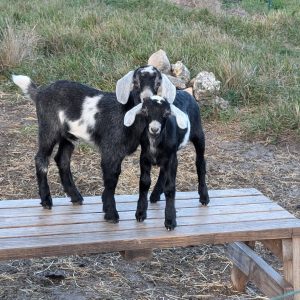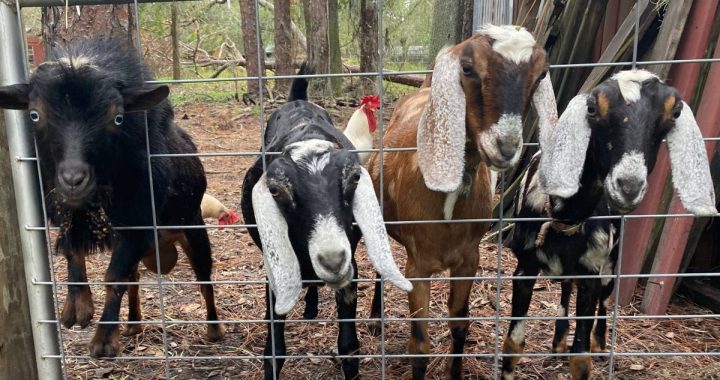A Beginner’s Guide to Mini Goats

Raising mini goats can be a delightful and rewarding experience. These charming, pint-sized animals are known for their friendly personalities and manageable size, making them perfect for small farms or even urban homesteads. If you’re new to mini goats, this guide will walk you through the essentials of caring for these adorable creatures.
-
Choosing the Right Breed
There are several breeds of mini goats, each with its unique characteristics. Some popular breeds include:
- Nigerian Dwarf Goats: Known for their small size and high milk production.
- Pygmy Goats: Compact and friendly, ideal for petting zoos and family farms.
- Kinder Goats: A cross between Nigerian Dwarf and Pygmy goats, known for their dual-purpose milk and meat qualities.
- Mini-Nubian Goats: These small to midsize goats are Nigerian Dwarf goats crossed with a Nubian dairy goat. These goats are friendly, high-capacity milkers, but can be louder than their Nigerian Dwarf counterparts.
- Mini-Lamancha: This is another Nigerian Dwarf Cross breed with excellent milking and friendly demeanor.
- Visit the Miniature Dairy Goat Association Website for other breed examples of Mini Goats.
-
Setting Up Shelter and Fencing
Mini goats need a safe, comfortable environment to thrive.
- Shelter: Provide a sturdy, weatherproof shelter with good ventilation. A small barn or shed works well.
- Bedding: Use straw, wood shavings, Pelletized horse bedding, or hay for bedding. Clean and replace regularly to maintain hygiene.
- Fencing: Mini goats are curious and agile, so secure fencing is essential. Use strong wire mesh or electric fencing to keep them contained and protected from predators.
-
Feeding and Nutrition
Proper nutrition is crucial for healthy, happy mini goats.
- Hay: Hay should be the primary component of their diet. Alfalfa, Peanut or grass hay works well. Please note that wethers, castrated male goats, are susceptible to Urinary Calculi, kidney and bladder stones, that are linked to a diet which has an unbalanced Calcium to Phosphorus ratio.
-
- Ideal Ratio: Ensure the calcium to phosphorus ratio in their diet is at least 2:1. This helps prevent the formation of urinary stones.
- Sources of Calcium: Alfalfa hay contains a lot of calcium, providing wethers with a good quality grass hay is preferred.
- Avoid High-Phosphorus Grains: Limit grains like corn, wheat, and barley, which are high in phosphorus.
- Grain: Supplement their diet with a small amount of grain, especially for pregnant or lactating does. Many feed companies provide grain in pellet forms with complete goat nutrition built in and these are generally safer options than trying to mix your own grain into a balanced goat feed. Bucks and Wethers do not need grain unless you are trying to help them gain weight. Poorly formulated grain or pellets can cause fatal urinary calculi, make sure your feed is formulated specifically for goats and says that it has the correct calcium to phosphorus ratio.
- Minerals: Provide a free-choice mineral supplement specifically designed for goats. This is absolutely essential for the health of your goats, minerals can make a huge difference in your goats ability to withstand common parasites.
- Water: Ensure a constant supply of clean, fresh water.
-
Health and Wellness
Regular health checks and preventive care are vital for your mini goats’ well-being.
- Vaccinations: Keep up-to-date with vaccinations, such as CDT (Clostridium, Diphtheria, and Tetanus).
- Deworming: Only deworm your goats when they are experiencing high worm load. Every time you deworm, you are creating dewormer resistance in the surviving parasites. There’s so much information on this topic, that it can’t be covered in a simple paragraph, but I can’t stress enough to ONLY deworm when your goat is showing signs of having parasite problems: lethargy, poor FAMACHA score, scurs, weight loss. I’ll write a more detailed article on this soon.
- Hoof Care: Trim their hooves every 4-6 weeks to prevent overgrowth and infections.
- Veterinary Care: Establish a relationship with a veterinarian experienced in goat care.
- Join Goat Emergency Team: Join the Facebook group Goat Emergency Team and stay in good standing. They have an excellent file sections with one page sheets on goat care and treatment and the group offers immediate help and advice for any goat related emergency.
-
Socialization and Enrichment
Mini goats are social animals and need mental and physical stimulation.
- Companionship: Goats are herd animals, so always keep at least two to prevent loneliness. Other species don’t count, goats need goat company.
- Play Structures: Provide climbing structures, logs, and toys to keep them entertained. If you include some rough surfaces, it can help them keep their feet in good shape between farrier visits (or home manicures).
- Interaction: Spend time with your goats daily to build trust and strengthen your bond. Bring them small amounts of treats as a means to bridge the gap between stranger and friend. (Banana, apple slices, animal crackers, raw in the shell peanuts are all good goat treats)
-
Breeding and Raising Kids
If you plan to breed your mini goats, which you will need to do if you are looking to milk them, here are some key points to consider:
- Breeding Age: Does can be bred at around 1 year old, while bucks can start breeding at 8 to 12 weeks old. Watch bucklings for full extension, this will mean it’s time to separate them from Mom and sisters.
- Gestation Period: The average gestation period for goats is about 5 months or150 days.
- Birthing: Prepare a clean, quiet area for the doe to give birth. Monitor the process and assist if necessary.
- Kid Care: Ensure the kids get their first milk (colostrum) within the first few hours of birth. Keep them warm and dry and monitor their growth and health closely.
-
Legal and Zoning Considerations
Before getting mini goats, check local regulations and zoning laws to ensure you can legally keep goats on your property. Be sure to check with your homeowner’s insurance as well as some policies do not allow goats in their coverage plans.
Raising mini goats can be an enjoyable and fulfilling experience. With the right knowledge and care, you’ll have happy, healthy goats that bring joy and companionship to your life.
Happy goat raising!


